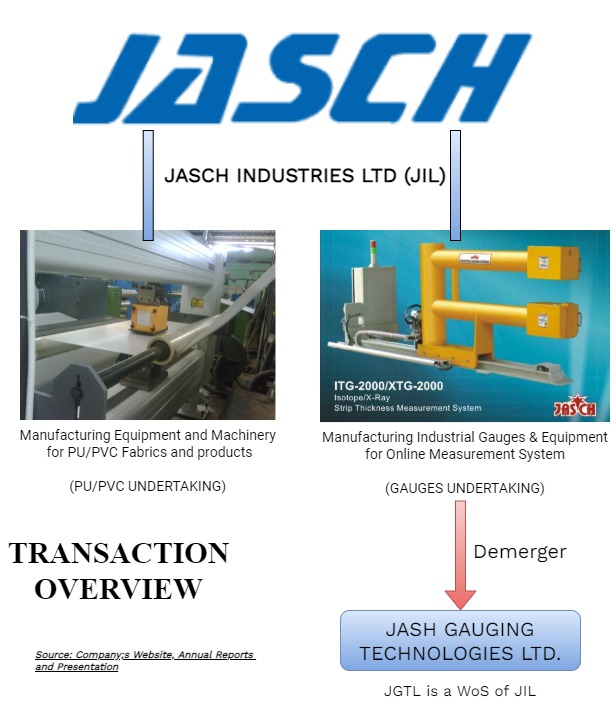The global pressure gauge market has a total revenue of 1296.24 million USD in 2014 and increased to 1432.68 million USD in 2018. It is estimated that the market size of the pressure gauge will be 1640.58 million USD by 2024 with a CAGR of 2.28% from 2018 to 2024.
The polymer coated fabrics market size is projected to reach USD 20.1 billion by 2024 from USD 16.3 billion in 2019, at a CAGR of 4.3%. The rising safety measures in the transportation application and stringent regulatory requirements for workers’ safety are expected to drive the polymer coated fabrics market.
Jasch Industries Limited (JIL) is a listed company engaged in
- Manufacturing, selling, importing, exporting, manipulate, treat process and deal in all types of polyitherenae, resin polyester and PU/PVC coated fabrics and technical textiles and deals in all kinds of equipment and machinery required to manufacture PU/PVC fabrics and other products; and
- Manufacturing of industrial gauges and equipment for the development of online measurement system.
Jasch Gauging Technologies Limited (JGTL) has been specifically incorporated as a wholly-owned subsidiary of JIL for the purpose of this transaction.
The Transaction:
JIL file a scheme of arrangement for the demerger of its Gauges manufacturing undertaking into JGTL and reorganization of its paid-up share capital after the demerger.

Appointed date for the transaction is 1st April 2021.
Rational of the Transaction:
- To attract/invite financial/strategic investors for the businesses.
- Provide a scope for independent growth and expansion.
Is this restructuring a step towards succession planning since the JIL is owned and managed by the Jai Kishan Garg and his three sons?
Rationale for the reorganization of paid share capital (i.e. reduction of paid-up share capital without payment) is primarily to enhance/improve financial ratios.
Valuation and Swap Ratio:
Currently, the Resulting Company is a wholly-owned subsidiary of the Demerged Company. Upon demerger, the shareholding pattern of the resulting company will mirror that of the demerged company in % terms. The resulting company JGTL will issue 2 equity shares of ₹10 each to the shareholder of JIL who holding 5 equity shares (i.e. 2 shares for every 5 shares).
Reduction of Capital:
Post demerger, the paid-up equity share capital of JIL will reduce in the proportion of net worth transfer to the resulting company (JGTL). i.e. reduce same no. of shares as issued by the resulting company.
Accounting Treatment:
Accounting treatment for the transaction is done according to appendix ‘C’ of Ind As 103- ‘Business Combination’.
Taxation:
The transaction is tax neutral transaction as per section 47(vi) read with section 2(19AA). There is no tax liability arises in the hands of shareholders and companies involved in transactions.
The Scheme provides for –
Transfer of Minimum Alternative Tax (MAT) Credit
As provided in para 12 of the scheme MAT credit related to demerged undertaking on the Appointed date shall be treated as MAT credit of the resulting company. As in the case of MAT credit, there is no explicit provision in income tax regarding carried forward of MAT credit to the resulting company like provide in sections 35AB(3), 35D(5A), 35DDA(3), 72A(4) etc. However, ITAT Ahmedabad in the case of Adani Gas Ltd, relying upon Supreme Court decision in Marshall Sons & Company India Ltd, allowed the transfer of MAT Credit to the resulting company, though at that point of time there was no MAT tax.
Capital Reduction:
The scheme in para 16.4 provides that Post demerger the paid-up equity share capital of JIL will reduce in the proportion of net worth transfer to resulting company (JGTL) by reducing no. of shares.
The question thus arises whether on reduction of no. of share, the capital loss allowed to shareholders or not?
In this regard, the Special Bench of the Mumbai ITAT in Bennett Coleman vs. ACIT TS-580-ITAT-2011 had disallowed a shareholder’s claim for capital loss on reduction of share capital since the shareholder’s percentage of shareholding, immediately before reduction of share capital and immediately after such reduction, remained the same. Also, there was no consideration received by the shareholder in lieu of reduction of share capital and hence, the Tribunal termed the shareholder’s claim as merely a notional loss which was not allowed.
The Bangalore ITAT in case of Jupitar Capital Pvt. Ltd. v. ACIT (ITA No. 445/Bang/2018) the capital loss due to reduction of share capital allowed. However, in this case, it is pertinent to note that the assessee received some consideration on account of capital reduction, which is a different fact pattern, as compared to the Bennett Coleman case (Supra) wherein no consideration was received. For more details about taxation in case of capital reduction read our article published May 2021 edition.
Further also note that whether shares issued by the resulting company pursuant to the demerger will be treated as consideration for reduction of shares?
It is not clear whether it will be treated as a consideration for the reduction of capital in the demerged company. To avoid any litigation, one can consider reducing the face value of equity shares and then consolidating the shares as desire. Similar restructuring was done in the Scheme of demerger of Ortin Laboratories Limited into Vineet Laboratories Limited.
Past Scheme of Demerger:
In 2016 JIL filed a scheme of demerger of the same division i.e. demerger of Industrial Gauge Division but the scheme was withdrawn in 2017 from Hon’ble NCLT (NATIONAL COMPANY LAW TRIBUNAL) allegedly saying that post demerger both companies become too small, so the demerger is not beneficial for the stakeholders or company.
Financials:
Brief segmental financial statements of last five years of JIL are as follow.
From the above chart, it is clear that the gauge manufacturing division is doing good as compared to the synthetic leather cloth and allied products division. The assets turnover ratio of synthetic leather cloth and allied products division is good as compared to gauge manufacturing division.
The same scheme (i.e., the demerger of Gauge division) was withdrawn in 2017 saying that post demerger both the companies is too small to attract investors, so it is not beneficial for stakeholders or the company. It is interesting that the turnover and assets of both the divisions in FY 2021 circa the same as compared to FY 2017. Further, there is no major expansion is done by the company except reducing liabilities. Further also note that the company diluted its entire stake in subsidiaries in the past and currently does not have any subsidiaries.
Conclusion:
There is no clarity about the strategic reason for the scheme as both the divisions are too small. No doubt, there may not be any synergies between the two businesses in terms of customers and manufacturing capabilities required. Under the circumstances, it is doubtful that it will end up creating any value for the company or its stakeholders.





Very good analysis about the company.. after demerger JGTL looks very attractive valuation.